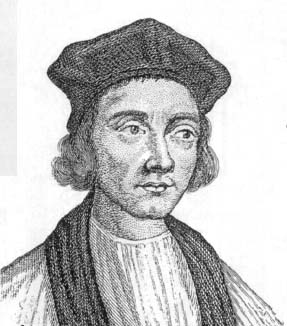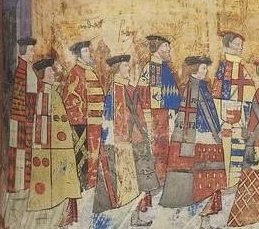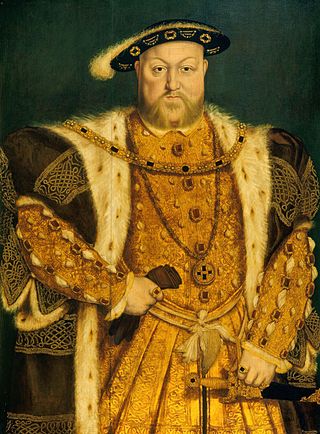Related Research Articles

Reginald Pole was an English cardinal and the last Catholic archbishop of Canterbury, holding the office from 1556 to 1558, during the Counter-Reformation.

Edmund Bonner was Bishop of London from 1539 to 1549 and again from 1553 to 1559. Initially an instrumental figure in the schism of Henry VIII from Rome, he was antagonised by the Protestant reforms introduced by the Duke of Somerset and reconciled himself to Catholicism. He became notorious as "Bloody Bonner" for his role in the persecution of heretics under the Catholic government of Mary I of England, and ended his life as a prisoner under Queen Elizabeth I.

Cuthbert Tunstall was an English humanist, bishop, diplomat, administrator and royal adviser. He served as Bishop of Durham during the reigns of Henry VIII, Edward VI, Mary I and Elizabeth I.

William Parr, Marquess of Northampton, Earl of Essex, 1st Baron Parr, 1st Baron Hart, was the only brother of Queen Catherine Parr, the sixth and final wife of King Henry VIII. He was a "sincere, plain, direct man, not crafty nor involved", whose "delight was music and poetry and his exercise war" who co-authored a treatise on hare coursing. He was in favour with Henry VIII and his son Edward VI, under whom he was the leader of the Protestant party, but having supported the desire of the latter to be succeeded by the Protestant Lady Jane Grey, was attainted by Edward's Catholic half-sister, Queen Mary I. He was restored by her Protestant half-sister, Queen Elizabeth I. He married thrice but died without issue.

Sir Clement Higham MP JP PC of Barrow, Suffolk, was an English lawyer and politician, a Speaker of the House of Commons in 1554, and Chief Baron of the Exchequer in 1558–1559. A loyal Roman Catholic, he held various offices and commissions under Queen Mary, and was knighted in 1555 by King Philip, but withdrew from politics after the succession of Queen Elizabeth I in 1558.

Henry Courtenay, 1st Marquess of Exeter, 2nd Earl of Devon, KG, PC, feudal baron of Okehampton, feudal baron of Plympton, of Tiverton Castle, Okehampton Castle and Colcombe Castle all in Devon, was a grandson of King Edward IV, nephew of the queen consort, Elizabeth of York and a first cousin of King Henry VIII. Henry Courtenay was a close friend of Henry VIII, having "been brought up of a child with his grace in his chamber".

Thomas Godwin was an English bishop, who presided over the Diocese of Bath and Wells.

William Petow was an English Franciscan friar and, briefly, a Cardinal.

Jane Dormer, Duchess of Feria was an English lady-in-waiting to Mary I who, after the Queen's death, married Gómez Suárez de Figueroa y Córdoba, 1st Duke of Feria and went to live in Spain, where she would become a magnet for exiled English Catholics. She maintained a correspondence with Queen Elizabeth, and also corresponded with contacts sympathetic to the Catholic cause in England. Within Spain she championed the cause of exiled English fallen on hard times. On her husband's death in 1571 she took over the management of his estates. She died in Spain on 13 January 1612 and was buried at the monastery of Santa Clara in Zafra.
Christopher Goodman BD (1520–1603) was an English reforming clergyman and writer. He was a Marian exile, who left England to escape persecution during the counter-reformation in the reign of Queen Mary I of England. He was the author of a work on limits to obedience to rulers, and a contributor to the Geneva Bible. He was a friend of John Knox, and on Mary's death went to Scotland, later returning to England where he failed to conform.
This article is about the particular significance of the century 1501–1600 to Wales and its people.

Thomas Harding was an English Roman Catholic priest and controversialist. He was one of the Worthies of Devon of the biographer John Prince (d.1723).

John Bird was an English Carmelite friar and subsequently a bishop.

The English Reformation took place in 16th-century England when the Church of England was forced by its monarchs and elites to break away from the authority of the pope and the Catholic Church. These events were part of the wider European Reformation, a religious and political movement that affected the practice of Christianity in Western and Central Europe.
Henry Cole was a senior English Roman Catholic churchman and academic.
Seth Holland was an English Roman Catholic churchman, Dean of Worcester and Warden of All Souls' College, Oxford under Queen Mary, but imprisoned in the Marshalsea under Elizabeth I, where he died.
Richard Tracy was an English lay Protestant reformer and Member of Parliament.
Richard Turner was an English Protestant reformer and Marian exile during the reign of Queen Bloody Mary.
William Peryn was an English Roman Catholic priest and Dominican friar who in the reign of Mary I became prior of the short-lived Priory of St Bartholomew's, Smithfield, London.
Sir Robert Acton, of Elmley Lovett and Ribbesford, Worcestershire and Southwark, Surrey, was an English politician.
References
- Lee, Sidney, ed. (1895). . Dictionary of National Biography . Vol. 44. London: Smith, Elder & Co.